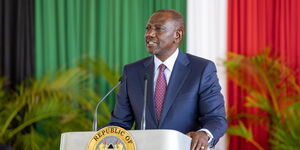President William Ruto has maintained that he will complete all the commitments he made to Kenyans, a majority of them in his first term.
Ruto, who has been under ridicule and pressure to exit office at the end of his first term, mainly due to the unpopular government decisions on issues such as taxes, police brutality, and forced disappearances, assured that his administration would not be cowed from undertaking critical infrastructural decisions.
Speaking in Karen during a cabinet retreat, which brought together senior government officials, Ruto lashed out at the critics of his development agenda and maintained that he has no intention of escaping any of the commitments he made during the last campaigns.
According to Ruto, he will continue his transformative agenda without waiting for a second term to better the lives of Kenyans, to avoid a waste of time in service delivery.
''I have no intention of escaping any of the commitments we made. We intend to keep them because that is how we are going to transform Kenya. I often get the accusation that we overpromised, but I want to tell you that we did not. We promised what is doable and we will deliver on our manifesto,'' Ruto stated.
"I have had people tell me, 'you have taken on too many difficult things; you would have waited for your second term.'" But why not finish the difficult things now? If there's a second term, there will still be plenty to do.''
The Head of State has, for instance, come under sharp criticism for implementing a series of mandatory deductions that have strained household incomes and fueled nationwide discontent. Among these is the Housing Levy, introduced under the Finance Act 2023, which compels salaried Kenyans to contribute a portion of their income towards the government’s Affordable Housing Programme.
Additional deductions include the Social Health Insurance Fund (SHA) contributions introduced in 2024 to replace NHIF, and the revised NSSF contributions, which were rolled out in early 2023 following a court ruling upholding the government’s push to increase retirement savings.
Together, these deductions have ignited public protests and legal challenges, with critics accusing the government of overburdening citizens amid a tough economic climate. Calls for Ruto’s resignation have also gained momentum, especially over concerns about police brutality, extrajudicial killings, and a perceived erosion of constitutional checks and balances.
Nonetheless, Ruto insisted his administration would not retreat from key infrastructure and social programmes, stating that lasting development requires tough but necessary decisions.
Meanwhile, the government aims to use the three-day retreat to deliberate on critical government programs and projects. According to Secretary to the Cabinet Mercy Wanjau, the retreat will serve as an opportunity for the Executive to conduct its midterm review.
"The 3rd upcoming National Executive Retreat will provide a moment to take stock of progress, evaluate impact, and make informed decisions about the path ahead," Wanjau noted in an OpEd published on Wednesday in one of the local dailies.
Consequently, Wanjau seemingly intimated that the retreat will address the state of employment in the country, which she described as having been recorded as “below target”.
She cited the 2025 Economic Survey report, which revealed that the labour market recovery was slower than expected, especially for the youth, who make up the bulk of Kenyans, and other vulnerable groups. “This remains an area of concern and a call to action.”












